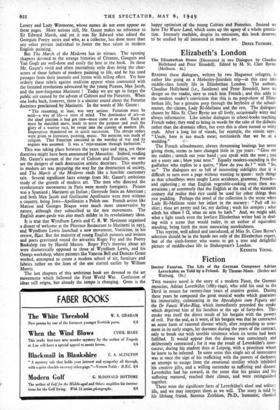Elizabeth's London
READING these dialogues, written by two Huguenot refugees, is rather like going on a Moberley-jourdain trip—in this case into middle-class family life in Elizabethan London. The authors, Claudius Hollyband (i.e., Sainliens) and Peter Erondell, have no design on the reader, save to teach him French ; and this adds to the modern reader's conviction that this is no peep-show of Eliza- bethan life, but a genuine peep through the keyholes of the school- master, the- citizen, Lady Ri-Mellaine and the rest. The dialogues chosen by Miss St. Clare Byrne are all lively, occasionally witty and always informative. Like similar dialogues in school-books teaching French today, they tend to bring in words for the sake of the didactic rather than the dramatic effect, but even this is often turned to witty ends. After a long list of viands, for example, the cousin says: " Uncle, here is too much meat; methinketh that we be at a wedding."
The French schoolmaster, always threatening beatings but never giving them, seems to have changed little in 35o years : " Give me my roddes ; stretch out your hand ; you speak with the nose ; you are a snoty one ; blow your nose." Equally modern-sounding is the godfather who replies to a query, " How do you do ? " with " So, so." The dialogues are so full of interesting sidelights that it is difficult to turn over a page without wanting to quote: such things as that schoolboys were taught Latin accidence,. grammar, French— and ciphering ; or that English vegetable-cooking even then was atrocious ; or conversely that the English at the end of the sixteenth century did realise that rice could be used for other things than rice pudding. Perhaps the jewel of the collection is the scene when Lady Ri-Mellaine visits her infant in the nursery : " Pull off his shirt ; - thou art pretty and fat, my darling ; wash his armpits what aileth his elbow ? 0, what an arm he hath." And, we might add, what a light touch even the lowliest Elizabethan writer had in deal- ing with a scene that would today, in an author of equivalent standing, bring forth the most nauseating mawkishness.
This reprint, well edited and introduced, of Miss St. Clare Byrne's selection should be in the hands not only of the Elizabethan expert, but of the sixth-former who wants to get a true and delightful picture of middle-class life in Shakespeare's London.
KENNETH YOUNG.






































 Previous page
Previous page